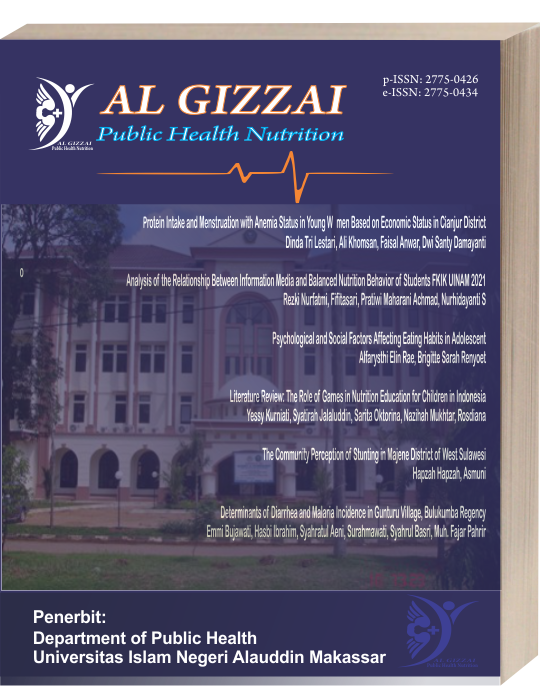Psychological and Social Factors Affecting Eating Habits in Adolescent
Abstract
Eating behavior is a means or what a person continuously as the characteristics of the individual in meeting the needs, both physiologically, socially and emotionally to food to meet the need of nutrition for the body. The purpose of this literature study is to examine and explore psychological and social related factors that influence eating habits in adolescents. The method used is a literature study using eight relevant research journals as the main reference. The results of this study, it was found that psychological and social factors can affect eating habits in adolescents. Adolescent psychology will be greatly influenced by the social environment of adolescents such as from the family environment, school environment, peers, culture, health status and also the economy. The wrong eating habits of adolescents can lead to eating disorders and nutritional problems in adolescents. Psychosocial factors are known to greatly influence the changes in eating habits in adolescents. Changes in eating habits due to these factors will lead to nutritional problems in adolescents.
References
Badrah, Sitti., Reny Noviasty, Rahmi Susanti. (2020). Screening of Eating Disorders Risk with Scoff Tool on Adolescents in Samarinda City. Journal LA Medihealtico, 1(2); 26-03
Bittar, C., & Soares, A. (2020). Media and eating behavior in adolescence. Cadernos Brasileiros de Terapia Ocupacional, 28, 291-308.
Hafiza, Dian., Agnita Utami, Sekani Niriyah. (2020). Hubungan Kebiasaan Makan Dengan Status Gizi Pada Remaja SMP YLPI Pekanbaru. Jurnal Medika Hutama, 2(1)
Jumalda, Alma Elvia., Linda Suwarni, Marlenywati, Selviana, Mawardi. (2021). Pola Makan Masyarakat di Kota Pontianak Selama Pandemi COVID-19. Jurnal Kesehatan Masyarakat Indonesia, 16(1).
Kadir. A. (2016). Kebiasaan Makan Dan Gangguan Pola Makan Serta Pangaruhnya Terhadap Status Gizi Remaja. Jurnal Publikasi Pendidikan, 6(1)
Kementrian Kesehatan, RI. (2018). Hasil Utama Riset Kesehatan Dasar 2018. Jakarta: Kemenkes RI
Noer, Ratna Etika., Erin Ratna Kustanti, Addina Rizky Fitriyanti. (2018). Perilaku Gizi dan Faktor Psikososial Remaja Obes. Jurnal Gizi Indonesia (The Indonesian Journal of Nutrition), 6(2)
Otto, Alana K., Jessica M. Jary, Julie Sturza, Catherine A Miller, Natalie Prohasca, Therrill Bravender, Jessica Van Huysse. (2021). Medical Admissions Among Adolescents With Eating Disorders During the COVID-19 Pandemic. Journal of American Academy of Pediatrics, 1(1).
Pantaleon, Maria Goreti. (2019). Hubungan Pengetahuan Gizi dan Kebiasaan Makan dengan Status Gizi Remaja Putri di SMA Negeri II Kota Kupang. CHMK Health Journal, 3(3)
Rahayu, Tri Budi., Fitriana. (2020). Analisis Faktor-faktor Yang Mempengaruhi Status Gizi Remaja Putri. Jurnal Vokasi Kesehatan, 6(1); 46-51
Risti, Khairunnisa Nadya., Eti Poncoroni Pamungkasari, Suminah Suminah. (2021). Relationship of Peer Influence and Family Eating Habits on Healthy Food Choices in Overweight Adolescents in Surakarta. Media Gizi Indonesia (National Nutrition Journal, 16(2).
Sempaga, Chindy Annisa Putri Mandala. (2021). Faktor-faktor yang berhubungan dengan gangguan makan pada remaja. Jurnal Penelitian Perawat Profesional, 3(4).
Stok, F.Marijn., Emely de Vet, Denise T.D de Ridder, John B.F. de Wit. (2016). The Potential of Peer Social Norms to Shape food Intake in Adolescents and Young Adults: A Systematic Review of Effects and Moderators. Health Psychology Review 10(3); 326-340.
Zaini, Mad. (2019). Hunungan Stress Psikososial Dengan Status Gizi Pada Mahasiswa Kesehatan di Kabupaten Jember. Jurnal Kesehatan, 8(1)
Copyright (c) 2022 Alfarysthi Elin Rae

This work is licensed under a Creative Commons Attribution-NonCommercial-ShareAlike 4.0 International License.
Authors retain copyright and grant the journal right of first publication with the work simultaneously licensed under a Creative Commons Attribution-NonCommercial-ShareAlike 4.0 International License that allows others to share the work with an acknowledgment of the work's authorship and initial publication in this journal.
Authors are able to enter into separate, additional contractual arrangements for the non-exclusive distribution of the journal's published version of the work (e.g., post it to an institutional repository or publish it in a book), with an acknowledgement of its initial publication in this journal.
Authors are permitted to publish their work online in third parties as it can lead to wider dissemination of the work.










